Honda Jazz VS Hyundai Bayon
Honda Jazz
The Honda Jazz stands out in the compact car category with its intelligently designed interior, offering a surprisingly spacious cabin that comfortably accommodates passengers and luggage. Its efficient hybrid powertrain ensures a smooth and economical driving experience, ideal for both urban commutes and longer journeys. Furthermore, the Jazz is equipped with a range of advanced safety features, providing peace of mind while on the road.
detailsHyundai Bayon
The Hyundai Bayon is a compact crossover that effortlessly merges practicality with modern design. Its sleek exterior and spacious interior make it an ideal choice for urban settings and longer journeys alike. With a focus on comfort and connectivity, this vehicle provides a smooth driving experience paired with advanced technology features.
details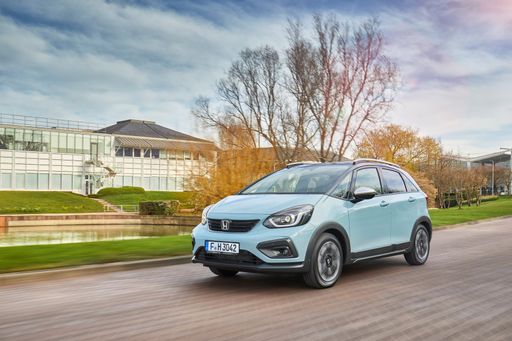 @ hondanews.eu
@ hondanews.eu
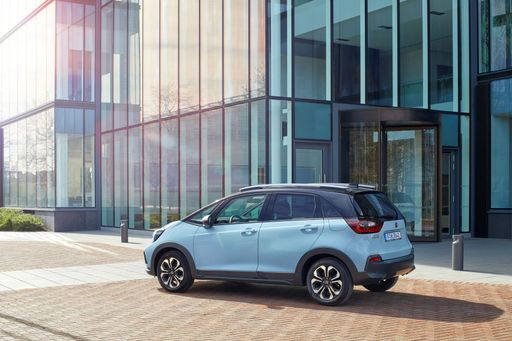 @ hondanews.eu
@ hondanews.eu
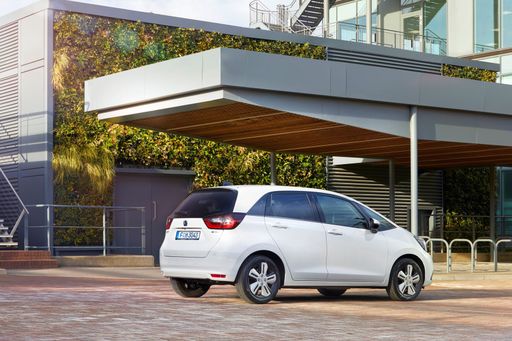 @ hondanews.eu
@ hondanews.eu
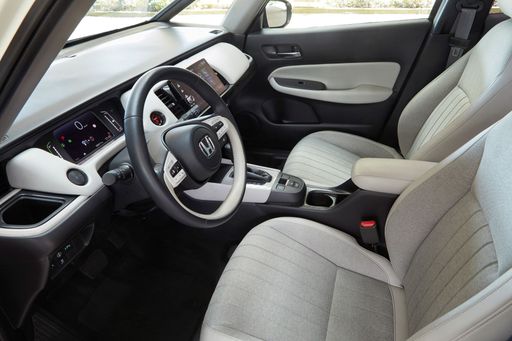 @ hondanews.eu
@ hondanews.eu
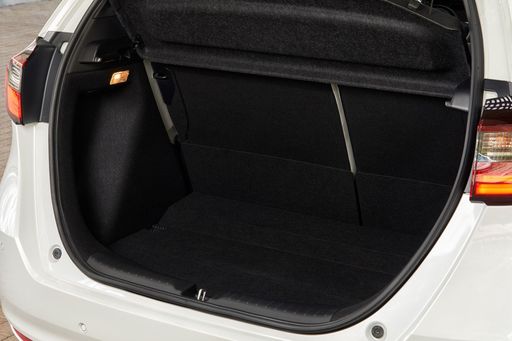 @ hondanews.eu
@ hondanews.eu
 @ hyundai.news
@ hyundai.news
 @ hyundai.news
@ hyundai.news
 @ hyundai.news
@ hyundai.news
 @ hyundai.news
@ hyundai.news
 @ hyundai.news
@ hyundai.news

|

|
|
|
|
Costs and Consumption |
|
|---|---|
|
Price
about 23100 - 26100
£
|
Price
about 19600 - 25400
£
|
|
Consumption L/100km
4.5 - 4.8
L
|
Consumption L/100km
5.4
L
|
|
Consumption kWh/100km
-
|
Consumption kWh/100km
-
|
|
Electric Range
-
|
Electric Range
-
|
|
Battery Capacity
-
|
Battery Capacity
-
|
|
co2
102 - 108
g/km
|
co2
122
g/km
|
|
Fuel tank capacity
40
L
|
Fuel tank capacity
40
L
|
Dimensions and Body |
|
|
Body Type
Hatchback
|
Body Type
SUV
|
|
Seats
5
|
Seats
5
|
|
Doors
5
|
Doors
5
|
|
Curb weight
1302 - 1320
kg
|
Curb weight
1170 - 1195
kg
|
|
Trunk capacity
304
L
|
Trunk capacity
411
L
|
|
Length
4089 - 4105
mm
|
Length
4180
mm
|
|
Width
-
|
Width
1775
mm
|
|
Height
1526 - 1556
mm
|
Height
1500
mm
|
|
Payload
370 - 388
kg
|
Payload
460 - 465
kg
|
Engine and Performance |
|
|
Engine Type
Full Hybrid
|
Engine Type
Petrol
|
|
Transmission
Automatic
|
Transmission
Manuel, Automatic
|
|
Transmission Detail
CVT
|
Transmission Detail
Manual Gearbox, Automat. Schaltgetriebe (Doppelkupplung)
|
|
Drive Type
Front-Wheel Drive
|
Drive Type
Front-Wheel Drive
|
|
Power HP
122
HP
|
Power HP
100
HP
|
|
Acceleration 0-100km/h
9.4 - 9.7
s
|
Acceleration 0-100km/h
11.3 - 12.4
s
|
|
Max Speed
175
km/h
|
Max Speed
176 - 179
km/h
|
|
Torque
253
Nm
|
Torque
172 - 200
Nm
|
|
Number of Cylinders
4
|
Number of Cylinders
3
|
|
Power kW
90
kW
|
Power kW
74
kW
|
|
Engine capacity
1498
cm3
|
Engine capacity
998
cm3
|
|
Top speed
175
km/h
|
Top speed
176 - 179
km/h
|
General |
|
|
Model Year
2023
|
Model Year
2024
|
|
CO2 Efficiency Class
C
|
CO2 Efficiency Class
D
|
|
Brand
Honda
|
Brand
Hyundai
|
Honda Jazz
The Evolution of the Honda Jazz: A Modern Marvel in Compact Design
The Honda Jazz, known for its compact yet spacious design, continues to impress with its blend of practicality and innovation. Today, we delve into the technical details and innovations that make the latest models of the Honda Jazz stand out in the competitive auto market.
Hybrid Powertrain: Efficiency and Performance
The Honda Jazz is equipped with a cutting-edge 1.5 i-MMD e:HEV full hybrid engine, delivering an impressive 122 PS, or 90 kW. This powertrain seamlessly balances efficiency and performance, achieving a fuel consumption of 4.5 to 4.8 L/100km. Whether navigating the city streets or taking on longer journeys, the Jazz provides a responsive and smooth driving experience, accentuated by its CVT automatic transmission.
Sleek Design with Smart Storage Solutions
Staying true to its roots, the Honda Jazz maintains a compact exterior with dimensions ranging from 4089 to 4105 mm in length and 1526 to 1556 mm in height. Despite its size, the Jazz offers ample luggage capacity of 304 litres, thanks to the intelligent Magic Seat system that allows for flexible storage configurations. The combination of a sleek design with practical storage makes the Jazz an ideal city companion.
Advanced Technology and Comfort
The Honda Jazz doesn’t stop at efficiency; it also comes packed with a plethora of technological features. As part of its high-tech package, the Jazz includes a state-of-the-art infotainment system and various driving assistance technologies, enhancing both safety and comfort. Families and commuters alike will appreciate the thoughtfully designed interior, seating up to five passengers with ease.
Performance and Handling Dynamics
The driving experience of the Honda Jazz is primarily characterised by its lively handling and assured grip thanks to its front-wheel-drive configuration. With a torque of 253 Nm and a 0-100 km/h acceleration between 9.4 to 9.7 seconds, the Jazz offers adequate performance for everyday urban driving. The maximum speed reaches 175 km/h, ensuring the Jazz can hold its own on motorways too.
Environmental Responsibility and Cost Efficiency
In an era of heightened environmental awareness, the Honda Jazz stands out with a CO2 emission range of 102 to 108 g/km, adhering to the CO2 Efficiency Class C. Cost-conscious consumers will appreciate the Jazz's low running costs, with potential expenses ranging from €812 to €877 per month and a cost per kilometre of 32.5 to 35.1 cents.
Conclusion: A Comprehensive Package
Combining innovation, economy, and style, the Honda Jazz serves as a testament to Honda's commitment to evolving their compact range to meet the modern driver's needs. For those seeking a reliable, efficient, and technologically advanced vehicle, the Honda Jazz stands ready to elevate their driving experience.
Hyundai Bayon
Introducing the Hyundai Bayon: A New Era in Compact SUVs
The Hyundai Bayon, a compact SUV designed with urban adventurers in mind, is making waves with its exceptional blend of style, performance, and technology. The brand has pulled out all the stops to ensure that the Bayon stands out in the crowded SUV market, offering a vehicle that is both practical and innovative.
Sleek Design and Cutting-Edge Aerodynamics
The Bayon features a striking exterior design, characterised by its bold lines and angular shapes. With a length of 4180 mm, a width of 1775 mm, and a height of 1500 mm, the Bayon commands attention with its modern appeal and aerodynamic efficiency. These dimensions not only contribute to its sleek design but also enhance fuel efficiency, achieving an impressive 5.4 L/100 km.
Engine Performance and Specifications
Under the bonnet, the Bayon is powered by a 1.0-litre T-GDI petrol engine, delivering a robust 100 PS or 74 kW. This engine is available with either a manual or automatic gearbox, meeting varied driver preferences. The front-wheel-drive system complements its urban-centric design, ensuring a smooth and responsive ride.
Maximised Interior Space and Comfort
The spacious interior of the Bayon accommodates up to five passengers comfortably. The vehicle boasts a boot space of 411 litres, perfect for both everyday use and weekend getaways. The cabin is designed with practicality and technology in mind, with intuitive controls and ample storage options.
Advanced Technology and Connectivity
Hyundai has equipped the Bayon with state-of-the-art technology to enhance the driving experience. The SUV features a high-resolution touchscreen, offering seamless connectivity with Apple CarPlay and Android Auto. Safety is also a priority, with multiple driver assistance systems including lane-keeping assist and forward collision avoidance assist.
Environmental Efficiency
Despite its powerful performance, the Bayon achieves a respectable CO2 efficiency class of D, with emissions as low as 122 g/km. This balance between performance and environmental responsibility makes the Bayon an attractive option for conscientious drivers.
Affordability and Market Appeal
The Hyundai Bayon is competitively priced, ranging from €22,900 to €29,600. Its affordable running costs, estimated at 32.3 to 36.4 cents per kilometre, further enhance its appeal to budget-conscious consumers. With monthly costs ranging from €806 to €909, the Bayon provides excellent value without compromising on features or performance.
Final Thoughts
The Hyundai Bayon truly stands out in the compact SUV segment, combining style, innovation, and practicality in an appealing package. It offers a versatile driving experience suited to the demands of modern urban living, making it a top contender in its class. As Hyundai continues to champion forward-thinking design and technology, the Bayon is a testament to the company's ongoing commitment to excellence.
